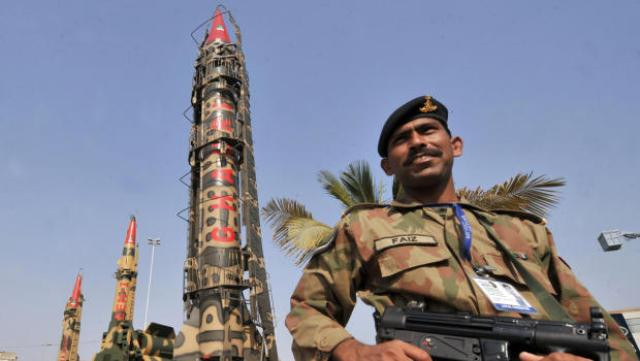IAEA refutes Indian media reports of radiation leak in Pakistan
IAEA says no radiation leak or incident detected at any nuclear site in Pakistan, dismissing all speculation.

As Pakistan and India trade accusations over nuclear weapons mismanagement, the International Atomic Energy Agency (IAEA) confirmed to BBC Urdu on Thursday that “no radiation leakage or incident has been detected at any nuclear site in Pakistan.”
The issue came up after unverified reports emerged in Indian media, alleging that Indian airstrikes targeted Pakistan’s Kerana Hills, where a stockpile of nuclear missiles is reportedly located.
Amid the media speculation, the IAEA confirmed to the British broadcaster that “based on available data, no radiation leakage or incident has been detected at any nuclear site in Pakistan.” The Indian Air Force also denied striking any nuclear facility.
Read more: Pakistan slams Indian defence minister’s remarks on nuclear arsenal
Earlier, Indian Air Marshal AK Bharti was asked at a press briefing whether reports of a strike on the Kirana Hills nuclear site were accurate. “Thank you for informing us that there is a nuclear facility there—we didn’t know,” he said sarcastically, adding, “we did not target Kirana Hills, regardless of what is or isn’t there.”
India and Pakistan traded accusations of nuclear weapons mismanagement on Thursday, days after reaching a ceasefire agreement following days of escalation.
India’s Defence Minister Rajnath Singh said that the IAEA should take control of Pakistan’s nuclear weapons—just days after the two nuclear-armed neighbours concluded one of their worst military escalations in nearly three decades.
“Are nuclear weapons safe in the hands of such an irresponsible and rogue nation?” Singh asked while addressing soldiers in Srinagar, the capital of Indian Illegally Occupied Jammu and Kashmir (IIOJK). “I believe that Pakistan’s nuclear weapons should be taken under the supervision of the IAEA.”
Pakistan responded firmly, calling the remarks “provocative” and aimed at undermining the credibility of its nuclear deterrent. The Foreign Office strongly condemned the Indian Defence Minister’s comments, labelling them “irresponsible” and reflective of India’s “frustration and insecurity.”
“These remarks are not only misleading but also reflect a lack of understanding of the IAEA’s mandate,” said the FO spokesperson, adding that Pakistan does not rely on nuclear blackmail to maintain deterrence—unlike India.
Read more: DG ISPR warns Indo-Pak escalation could be 'recipe for mutual destruction'
The statement further noted that India’s remarks expose “growing insecurity over Pakistan’s robust conventional and nuclear deterrence,” while also citing past instances of nuclear material mishandling in India to question New Delhi’s own safety protocols.
The Indian minister’s statement comes at a sensitive time, as both countries attempt to maintain the 2021 ceasefire agreement along the Line of Control (LoC).
Deputy Prime Minister Ishaq Dar announced that the militaries of India and Pakistan have agreed to extend last week’s ceasefire until Sunday, May 18. Addressing the Senate on Thursday, he said the extension paves the way for renewed political dialogue.
Meanwhile, the Pakistani military’s chief spokesperson has cautioned that any serious escalation between the two nuclear-armed neighbours could have catastrophic consequences.
“The world now recognises the extent of the nuclear threat [in the region]. Any sane player, like the USA, understands this absurdity and what the Indians are trying to do here,” DG ISPR Lt Gen Ahmed Sharif Chaudhry told Sky News in an interview on Thursday.
“If India thinks that it can carve out a space for war between India and Pakistan, it is actually a recipe for carving out mutual destruction,” he added.




















COMMENTS
Comments are moderated and generally will be posted if they are on-topic and not abusive.
For more information, please see our Comments FAQ